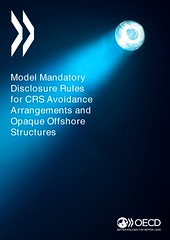Responding to a request of the G7, today, the OECD has issued new model disclosure rules that require lawyers, accountants, financial advisors, banks and other service providers to inform tax authorities of any schemes they put in place for their clients to avoid reporting under the OECD/G20 Common Reporting Standard (CRS) or prevent the identification of the beneficial owners of entities or trusts.
As the reporting and automatic exchange on offshore financial accounts pursuant to the CRS becomes a reality in over 100 jurisdictions this year, many taxpayers that held undeclared financial assets offshore have come clean to their tax authorities in recent years, which has already led to over 85 billion of additional tax revenue.
At the same time, there are still persons that, often with the help of advisors and financial intermediaries, continue to try hiding their offshore assets and fly under the radar of CRS reporting. The new rules released today target these persons and their advisers, by introducing an obligation on a wide range of intermediaries to disclose the schemes to circumvent CRS reporting to the tax authorities. The new rules also require the reporting of structures that hide beneficial owners of offshore assets, companies and trusts.
"Time is up for tax evaders and their advisors that still want to game the rules and continue to hide assets offshore", Pascal Saint-Amans, Director of the OECD Centre for Tax Policy and Administration said today. "With the automatic exchange of CRS information becoming a global reality this year, it is the right moment to get hold of those taxpayers and advisors that attempt to undermine the reporting on offshore assets and that try to play the new global tax transparency framework. The mandatory disclosure rules will be a powerful tool to detect taxpayers that continue to refuse to be compliant with their obligations to declare their assets and income to their tax authorities. They will also have a deterrent effect against the design, marketing and use of schemes to avoid CRS reporting or hide beneficial owners behind opaque offshore structures. This is key both for the integrity of the CRS and for making sure that taxpayers that can afford to pay advisors and to put in place complex offshore structures do not get a free ride."
These model disclosure rules will be submitted to the G7 presidency and are part of a wider strategy of the OECD to monitor and act upon tendencies in the market that try to avoid CRS reporting and hide assets offshore. As part of this work the OECD is also addressing cases of abuse of golden visas and similar schemes to circumvent CRS reporting.

No comments:
Post a Comment